Analytics, Ecology, Energy, Energy Market, Estonia
International Internet Magazine. Baltic States news & analytics
Saturday, 13.09.2025, 07:15
Estonian Renewable Energy Association: Growth of share of green energy is modest
 Print version
Print version |
|---|
"One of the most notable parts of a relatively cool year in terms of the sector's development was the notable increase in the installed solar power generation capacities in the second half of the year, which, however, will be mostly reflected in the electricity production statistics in 2019. In comparison of renewable electricity production, we continue to play the role of the chaser in Europe as a result of high share of oil shale energy," Annus said.
"Last year, the adoption of the Electricity Market Act brought some clarity regarding the framework regulating the renewable energy sector, while the conditions for renewable energy underbidding are still unclear. They need to be established quickly along with a plan for the organization of the first underbids, which will give the initiative to entrepreneurs for acting," the head of the association said.
According to transmission system operator Elering, altogether 1,665 gigawatt-hours of electric energy was produced to the network from renewable sources in 2018 -- a relatively modest increase compared with the 1,620 gigawatt-hours of the previous year -- which makes up 17.1 of the yearly consumption in Estonia.
Renewable energy produced from biomass, biogas and waste accounted for 62% of total renewable energy production last year. A total of 1,040 gigawatt-hours was produced from these sources during the year. In 2017, the amount of energy produced from the same sources totaled 908 gigawatt-hours.
Wind energy accounted for 36% of the total renewable energy produced in 2018, and wind farms produced a total of 590 gigawatt-hours of electricity during the year, 12% less than in 2017. Thus the limit set on subsidies for wind energy production -- 600 gigawatt-hours -- was not met also in 2018. Wind energy on which a subsidy was paid totaled 490 gigawatt-hours, 82% of the cap.
Output of hydro energy totaled 19 gigawatt-hours last year. As before, the biggest increase in comparison with the previous year was registered in solar energy, where the output volume nearly tripled to 13 gigawatt-hours and subsidies increased on the same scale, rising to more than 715,000 euros for the full-year. Although bigger than the total subsidy of 540,000 euros paid out on hydro energy, this is still a marginal portion of the total subsidies paid out. The number of solar panel owners exceeded 1,600 at year-end, with more than 700 panel owners added during the year.
Last year, the production of wind energy in Estonia totaled 591 gigawatt-hours, thus, similarly to the year before, the annual subsidy limit of 600 gigawatt-hours set for the supported wind power provided in the Electricity Market Act was not exceeded this year, either. In addition, the share of wind energy made up 36 percent of the total production of renewable electricity in 2018.
Annus said that global decline in the price of renewable energy solutions and the development of technologies is having an increasingly positive impact on the sector as a whole also in Estonia.
"By now, it is clear that in many cases, it is already economically more sensible to prefer renewable energy to fossil fuels, and this tendency is positively intensifying. Solar panels on the roofs of private houses are no longer a rare occurrence and increasingly more private consumers see this as an opportunity to save on household expenses," he added.
The drawing up of the national energy and climate plan was launched in 2018, which stipulates domestic renewable energy objectives by 2030. The share of renewable electricity in final consumption should be at least 30% in Estonia by that time and the overall share of renewable energy should be 50%. Estonia's target for renewable electricity by 2020 -- 17.6% -- has not been reached to date.








 «The Baltic Course» Is Sold and Stays in Business!
«The Baltic Course» Is Sold and Stays in Business!

